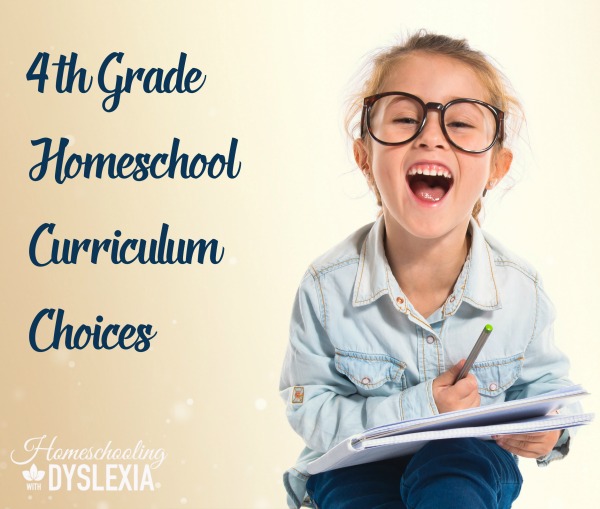
I received a message from a reader via the Homeschooling With Dyslexia Facebook Page a few weeks ago asking for help choosing homeschool curriculum resources for a newly diagnosed dyslexic 4th grader.
Wow! What an amazing response from all of you.
In fact, the response was so impressive, I decided to pull your recommendations and advice for this new homeschool mom and put them here.
Some of the resources in this post are already on my ever-growing list of recommended resources available on the Resources page. I don’t put anything on the Resources page that I haven’t personally used and loved.
I have not used all of the resources in this post so cannot personally vouch for them, however, my readers are awesome and in the trenches every day so I highly value their opinions! (Reader comments are in quotes with italics.)
This post contains some affiliate links. Affiliate links allow me to earn a very small commission on each product purchased through my link. You do not pay any extra. Thank you for helping to support Homeschooling With Dyslexia!

Reading Resources
All About Reading. Based on the Orton-Gillingham approach as well and considerably less expensive than Barton. Our family uses and highly recommends this resource as well.
Logic of English is another option for reading, spelling, & handwriting. Its multi-sensory approach to learning is similar to All About Reading, but is a unique program in that the student learns all the sounds of a phonogram at once.
Reading Horizons is an Orton-Gillingham based method. They offer computer software and direct instruction materials. Reading Horizons Elevate (10+) is for older learners like your daughter and they have Reading Horizons Discovery for younger learners (4-9). They also provide free parent training if you want to learn the method. Reading Horizons is more accessible and easier to teach and learn than Wilson or Barton but still so effective.
Barton Many readers use and have success with Barton.
Nessy Reading and Spelling has been developed by a team of specialist teachers and psychologists to help children with dyslexia and reading disabilities.
Raz-kids.com. The leveled books have listening, reading, and comprehension questions. “My son loves listening to books even far above his independent reading level.”
Spelling Resources
All About Spelling Used alongside All About Reading after Level 1 is completed.
See to Spell for learning to spell sight words – “They made a huge difference for us!”
Also see I See, I Spell, I Learn for similar illustrated sight word cards.
Writing Resources
Institute for Excellence in Writing (IEW)
Just Write – from Educators Publishing Service. “There are 3 levels of books. Both my dyslexic children really struggled in writing. These books provide a nice easy introduction and implementation of the writing process that is then gently practiced again and again throughout the workbooks. I started my daughter in book 2 in third grade and she finished book 3 in 4th. My son who is going into 8th grade is profoundly dyslexic, and I had him complete book three as a reminder/refresher last year. Worked wonders.”
Literature Resources
Moving Beyond the Page Moving Beyond the Page has 12 literature packages for the year. “My daughter would be so over whelmed. We do 4-6 for the year. It’s all in one spelling, grammar, vocabulary and reading comprehension. My daughter has dyslexia so we do a grade level or two behind.”
Total Language Plus Using quality literature and integrates the separate parts of language arts: spelling, vocabulary, grammar, and writing, as well as critical thinking and communication.

Math Resources
Teaching Textbooks. Many Homeschooling With Dyslexia readers use and love Teaching Textbooks. Having the lessons read to the student was the most appreciated aspect of the program, closely followed by the interactive nature of the program and immediate feedback on missed problems. “Teaching Textbooks has worked very well for us for Math … in part because everything is read aloud to the student.”
CTC Math Similar to teaching textbooks, in that it is on the computer, but you get all levels at one time, so she could work on 3rd grade or 4th or go back and review. There are videos that show how to do each topic.
RightStart Math “There is very little writing, lots of hands-on games but quite rigorous. It’s direct instruction (by you, the teacher), so that must be factored in.”
Math U See Math U See is another long time favorite of our family and many of the WHD readers. “I highly recommend it because of the manipulatives and DVD teaching lessons. Basically she watches the video, does everything on her own unless she stumbles upon a word program. This is a Mastery program that is absolutely amazing.”
Times Tales is amazing for dealing with memorization of times tables. Taps into the visual learning strengths of many dyslexics.
Mathantics.com for great explanations of mathematical processes.
Life of Fred Funny, math-based stories that teach and entertain!
ProdigyGame.com “My son loves this for a supplement.”
ST Math Created by a dyslexic, but it does not have lecture lessons only practice problems.
Hands on Equations Lesson plans are laid out and there is a DVD that explains each lesson. “I used this for myself to make sure I understood the lesson. It uses a tactile/kinesthetic approach to learning which can be very helpful to a child with learning challenges.”
KahnAcademy.org for math.

Science Resources
Apologia They will give you the audio cd for free if your child is diagnosed.
Studies Weekly (History and Science) there is a website that corresponds with the colorful newspaper “schoolbook” and it reads it out loud to the student.
Science Shepherd It has a short 3-5 min video to watch on line and then a few questions to answer and an experiment once a week.
Science A-Z “My kids love this!”
Science teaching tip: “Do as many hands-on experiments as you can to learn about your topic. Don’t force writing. Let them just enjoy science. Scribe their observations, or have them just draw their observations instead.”
“Watch lots of science videos!”
For nature study, we use Shining Dawn Nature Books. “My kids take a pack outside, filled with water colors, sketchbooks, field guides, bug nets, measuring tape, and observation containers. They take pictures, draw or paint what they see, and look things up. They just love to explore.”

History Resources
Sonlight book lists “I was a Sonlight mom for years, and love their literature approach to learning but have found it was more difficult to use with a child who has a “language based learning disability” so I now just pull out good books from our stash and use them as read-alouds.”
Drive Thru History DVDs to supplement.
Liberty Kids is a neat cheap video series on Colonial/early United States history.
“Build that Charlotte Mason timeline. Put anything on it that you learn about. It makes all the difference to see it chronologically in photos.”
TAN books is coming out with an amazing multi-sensory program. “They listen to the story as they color a map or other picture pertaining to the material. There’s book recommendations, and crafts.”

Art & Music Resources
“We tried a curriculum but the kids got bored of it. So now, we just pick YouTube tutorials based on what we want to learn and we go with it. They love it!”
For Artist Study, we use Simply Charlotte Mason Picture Study Portfolios. “My kids really enjoy this.”
SQUILT (Super Quiet Uninterrupted Listening Time) for music.
Homeschool Methods
Charlotte Mason
Lots of HWD readers find a good fit with the Charlotte Mason method. “You will read aloud many excellent books helping your daughter build her vocabulary for when she can later read the books herself. This first year especially until her phonics and reading ability are smoother, she may need audio versions of her reading list so she can successfully understand the story and narrate it back to you, otherwise her reading difficulties may make her reading list too overwhelming and further discourage her.”
Take a look at Ambleside Online for a Charlotte Mason prepared reading list. “Your child will THRIVE with the nature studies! Just grab a few books at the library to read aloud on her nature study topics or use the internet.”
SimplyCharlotteMason.com for more Charlotte Mason resources.
Classical Conversations
Classical Conversations. It helps kids who learn through auditory methods with lots of fun songs and memory work. Read more about our own family’s experience with Classical Conversations here.
Unit Studies
“If you have easy access to a library consider doing unit studies- i.e. what animal do the kids want to study, get books read and learn!”
All-in-One Curriculum
Easy Peasy A free, Christian, online homeschool curriculum. “I read a lot of it aloud to my dyslexic 4th grader (like math word problems). He also uses a separate OG program for reading & LA but we still use Easy Peasy’s reading – listening to all the reading assignments via online audio book – which really boosts his comprehension and vocabulary. It has some Charlotte Mason elements and includes some great “living books” for science and history. The best part is that it’s free, so you can try it risk-free and get a feel for homeschooling and for your school style. The assignments are laid out day-by-day, so there’s not a lot of prep or extra work for the teacher/parent.”
Heart of Dakota uses living books and is Charlotte Mason based. “It would be easy to use with both your children together.”
My Father’s World is meant for family learning so that you are teaching mostly the same thing to all the kids. It uses a Charlotte Mason approach as well as having some classical aspects. (Note from Marianne: The Kindergarten, 1st and 2nd grade curricula are not a good fit for dyslexics. The multi-age history based lessons are fantastic!)
Verticy Learning (This is a branch of Calvert Homeschool) “I like the support the lesson manuals offer me as the teacher and the study skills taught along the way for the student. The book selections are grade level reading and I allow my kids to read along while listening to the book with Amazon Audible. Verticy offers an entire packaged curriculum for dyslexic learners.” Note from Marianne: I have had readers say there is too much material to cover with Verticy. Know that you will likely need to modify this curriculum to best meet your dyslexic student’s needs.
BJU Distance Learning Video-based lessons using the Bob Jones University Press curriculum.
Auditory Processing Help
Helpful Tips
- There were so many helpful tips from our readers! Some real gems here:
- Less is more. Choose a solid research-based reading curriculum and a math curriculum. Then simply supplement with field trips, time outside, reading good books and playing.
- Join a book store as an educator (need documents from school district) and get 20% off purchases.
- Don’t shortchanged yourself on your ability. I understand the concern you might have about being able to do it and the subsequent thought that a scripted program will make it easier, but it isn’t necessarily true.
- While you search for the best fit, just remember there is no 1 size fits all, but homeschooling does wonders!
- I learned the key for my oldest daughter, was to have curriculum that read to her as she followed along.
- I would focus on is developing an interest of hers or a shared interest for both of you.
- Don’t be afraid of audio books. It will keep her vocabulary exposure up until she’s reading more.
- If there are any homeschool conventions in your area it would be great to go. It’s nice to be able to go and look hands ons at all of this material.
- Read aloud daily to build love of books.
- Whatever topic we choose, we read living books about it aloud and it’s amazing the details that my dyslexic daughter with poor working memory can recall.
- Let them build models of events/societies they learn about.
- Again, videos and field trips are hugely helpful.
- Don’t force reading and writing with Social Studies. Leave that to Language Arts. Let them learn to love History, Geography, and Current Events without being weighed down by reading and writing.
- Your first year concentrate on the basics: language and math. Let the other flow with audio books, museum trips, videos, etc.
How about you? Do you have any tips, curricula or resources to add?
Other Homeschool Curriculum and Teaching Methods by the Grade:
Homeschooling Kids With Dyslexia: Preschool
Homeschooling Kids With Dyslexia: Kindergarten
Homeschooling Kids With Dyslexia: 1-3 Grades







We have just started using Nessy which has been light relief from a serious phonics programme. One of my children using Nessy would be a similar age. Here, in the UK, we were able to get a small home educator’s discount-it is worth asking!
Thanks Sarah Elisabeth! I am looking in to using it for my almost 9 year old over the summer. 🙂
I have a fourth grader who has been diagnoised with dyslexia and ADHD. He is an audio and hands-on learner. Would these suggestions still be a good suggestion?
Yes!
So lost this first year of homeschooling. I have a 5th grader age-wise, but I feel that he could probably fit into curriculum from grades 3 to 5. Do you have any suggestions? We have not had much success and I cannot just quit, however, I feel like we are not getting anywhere.
Hi Amanda,
You are not alone. There is a lot to learn about teaching kids with dyslexia at home. Keep reading and learning. Teach him at his level. Follow his lead. Get connected with other parents who are doing what you’re doing. My monthly membership site is a good place for that.
https://dev.homeschoolingwithdyslexia.com/beyond-the-box-learning/
Hi, I have a 3rd and 5th grader and they aren’t diagnosed but reading and writing has been very difficult for my kids and I’ve identified a lot with the information you’ve given about levels of dyslexia. I am thinking they both have a mild form. We changed last year to the Good and the Beautiful for language arts. They both showed progress but now that I am aware they could have dyslexia should I switch to an OG language arts program or keep going with Good and the Beautiful since they did have some progress? Any thoughts on that program?
Honestly, I would switch to an OG program however, if the kids enjoy it and are making progress, you could finish the year with it.